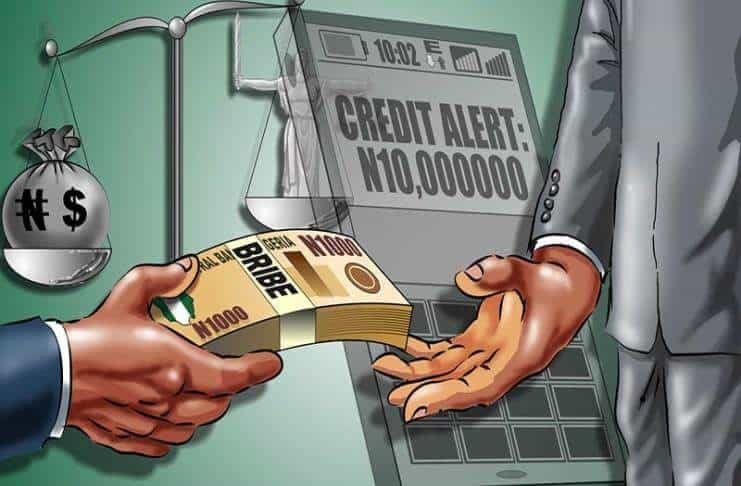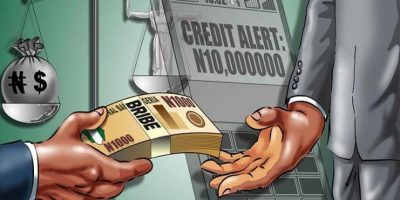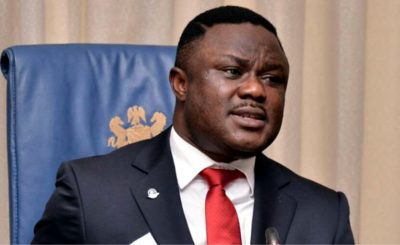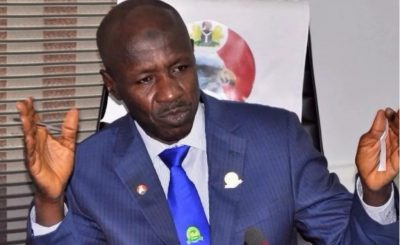Views: 24
NBS: Roughly N400BN In Bribes Given To Public Official Annually

Says bribery is an established part of administrative procedure in Nigeria. Police, judiciary identified as biggest bribe-takers
An estimated N400 billion, or the equivalent of $4.6 billion in purchasing power parity (PPP), representing 39 per cent of the combined federal and state education budgets in 2016, is paid out as bribes to public officials in Nigeria annually, a new report released by the National Bureau of Statistics (NBS), in collaboration with the United Nations Office on Drugs and Crime (UNODC), has revealed.
According to the report, the magnitude of public sector bribes in Nigeria becomes even more palpable when factoring in the frequency of the payments, adding that the majority of those who paid bribes to public officials did so more than once over the course of the year.
Bribe-payers, it added, pay an average of some six bribes in one year, or roughly one bribe every two months.
Roughly 400 billion Nigerian Naira is spent on bribes each year.
Taking into account the fact that nine out of every ten bribes paid to public officials in Nigeria are paid in cash and the size of the payments made, it is estimated that the total amount of bribes paid to public officials in Nigeria in the 12 months before the survey was around 400 billion Nigerian Naira (NGN), the equivalent of $4.6 billion in purchasing power parity (PPP). This sum is equivalent to 39 per cent of the combined federal and state education budgets in 2016. the report said.
It equally revealed that bribe-payers spend an eighth of their salary on bribes, noting that the average sum paid as cash bribe in the country was approximately N5,300, which is equivalent to roughly $61(PPP).
This means that every time a Nigerian pays a cash bribe, he or she spends an average of about 28.2 per cent of the average monthly salary of approximately NGN18,900.
Since bribe-payers in Nigeria pay an average of 5.8 bribes over the course of one year, 92 per cent of which are paid in cash, they spend an average of NGN 28,200 annually on cash bribes equivalent to 12.5 per cent of the annual average salary, it added.
The report, which is the first of its kind in the country in terms of scope, said Nigerians consider bribery the third most important problem facing their country.
The above findings could explain why, after the high cost of living and unemployment, Nigerians consider corruption to be the third most important problem facing their country, well ahead of the state of the country’s infrastructure and health services.
Public sector bribery is not the only form of corruption affecting Nigeria: the prevalence of bribery in relation to selected employees of private companies is 5.5 per cent, meaning that bribery is also significant in the private sector in Nigeria.
However, the payment of bribes to public officials is the most familiar and widespread form of corruption directly experienced by the population and the one that most affects the lives of ordinary citizens, it noted.
Giving an insight into how bribery works in the country, the report said public officials in Nigeria show little hesitation in asking for a bribe, noting that the vast majority of bribery episodes are initiated either directly or indirectly by public officials (85.3 per cent), while almost 70 per cent of bribes are paid before a service is rendered.
It stressed that with such a large portion of public officials initiating bribes, which are paid up-front, it seemed that many public officials show little hesitation in asking for a kickback to carry out their duty, adding that bribery is an established part of the administrative procedure in Nigeria.
While money is by far the most important form of bribe payment in Nigeria, the survey shows that other forms of bribe payment, such as the provision of food and drink, the handing over of valuables, or the exchange of another service or favour, also exist.
Qualitative research shows that such exchanges may sometimes include sexual services, although the actual extent of that particular form of bribe payment is unknown, the NBS report said.
The survey showed that a large proportion of bribes in Nigeria (42 per cent) are paid to speed up or finalise an administrative procedure that may otherwise be delayed for long periods or even indefinitely, thus making bribery the most effective option for facilitating that service.
According to the report, the second largest proportion of bribes (18 per cent) is paid to avoid the payment of a fine, a frequent request in citizens encounters with the police, while 13 per cent of all bribes are paid to avoid the cancellation of public utility services, an indication that the provision of the most basic amenities, including water and sanitation, can be subject to abuse of power by public officials in Nigeria.
On the categories of public servants indulging in bribery, the report said law enforcement and the judiciary were areas of particular concern.
Police officers are the type of public official to whom bribes are most commonly paid in Nigeria.
Of all adult Nigerians who had direct contact with a police officer in the 12 months prior to the survey, almost half (46.4 per cent) paid that officer at least one bribe, and in many cases more than one, since police officers are also among the three types of public officials to whom bribes are paid most frequently (5.3 bribes per bribe-payer over the course of 12 months) in Nigeria.
At the same time, the average bribe paid to police officers is somewhat below the average bribe size.
Although fewer people come into contact with judiciary officials than with police officers over the course of the year, when they do, the risk of bribery is considerable: at 33 per cent, the prevalence of bribery in relation to prosecutors is the second highest, closely followed by judges and magistrates, at 31.5 per cent.
The experience of corruption in encounters with public officials whose duty it is to uphold the rule of law can lead to the erosion of trust in public authority, it said.
The report put the prevalence rate of corruption in the public sector at 32.3 per cent, and the average number of bribes paid to public officials by bribe-payers at 5.8.
The total number of bribes paid to public officials in Nigeria in the 12-month period also stands at 82.3 million, while the per capita number of bribes paid to public officials by the adult population was 0.9 per cent.
The contact rate with public officials in the review period was 52.2 per cent; the prevalence rate in the rural setting was 31.0 per cent while 34.8 per cent was posted in the urban setting.
On the average number of bribes paid to public officials by adult Nigerians in the period, by zone, the North-west recorded 0.86 per cent; North-east 0.78 per cent; North-Central 1.1 per cent; South-West 1.13 per cent; South-South 1.05 per cent; and South-east 0.60 per cent.
The NBS said the data presented in the report was collected in the National Survey on the Quality and Integrity of Public Services, otherwise known as the Nigerian Corruption Survey, a project funded by the European Union and implemented by the UNODC in collaboration with the National Bureau of Statistics of Nigeria (NBS).
The statistical agency noted that the Nigerian Corruption Survey was designed as a large-scale household survey, representative at the level of the Nigerian states, with the aim of collecting baseline information.
The report is the first comprehensive nationwide household survey on corruption to be conducted in Nigeria and in Africa at large, and covers all states of the federation, including the Federal Capital Territory.
According to the NBS, the report provides very valuable and reliable information, which will support the national efforts at reducing the corruption menace, as well as blocking loopholes in public services.
The National Corruption Report, which covered the period between June 2015 and May 2016, also showed that almost a third of Nigerian adults (32.3 per cent) who had contact with public officials between June 2015 and May 2016 had to pay, or were requested to pay, a bribe to such public officials.








You must be logged in to post a comment.